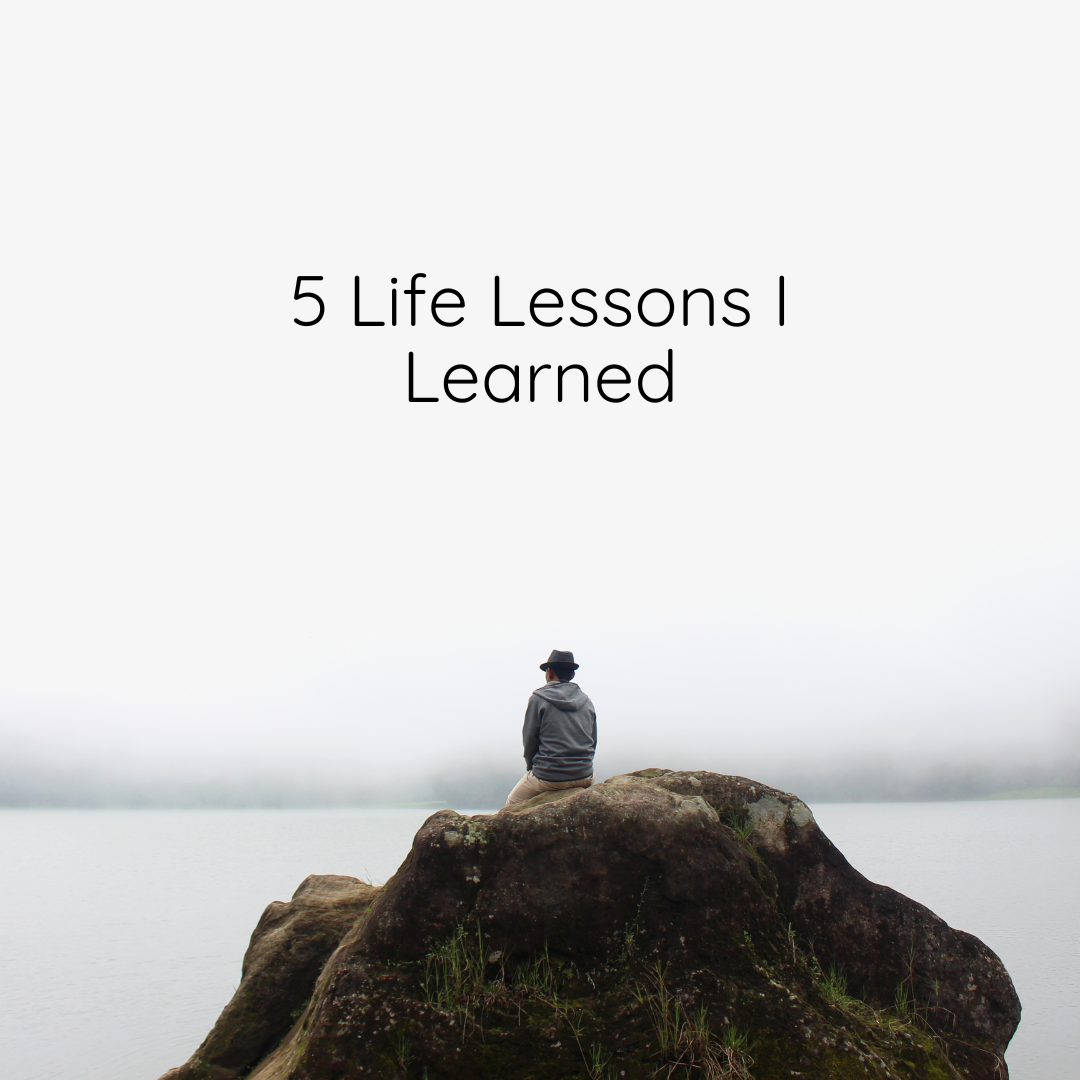Powerful Lessons I Learned from Failure
It is true that you learn much more from failure than you do from success.
In this post, I want to share 7 lessons I learned from failure. I want to share my mistakes that occurred mostly in my twenties and thirties.
By sharing my story, I hope to inspire you to reflect on your life, perhaps make changes, and approach things with a new perspective.
One of the worst traits in life is the inability to critically and objectively view your own actions.
And I do believe that in order to grow, we need to be able to notice our mistakes and learn from them. So I encourage you to take a notebook and a pen, and do the same.
Write down the lessons your failures have taught you and reflect on what you would now do differently.
Powerful Lessons I learned from failure
Work on Your Low Self-Esteem Early
The first lesson I learned from failure was about my self-esteem and confidence.
Low self-esteem can hold you back and prevent you from growing, no matter how much potential you have.
As a child, I struggled with very low self-esteem. I was shy, had trouble making friends, and often found it hard to showcase my knowledge in school. Exams were stressful, and I felt stuck in my own head. Looking back, I realize that my self-esteem issues were deeply ingrained. Interestingly, my sister, raised in the same environment, turned out completely different.
What I didn’t understand back then is how crucial confidence is to success. Confidence helps you approach people, ask for help when needed, and navigate challenges. Without it, every aspect of life—from friendships and relationships to career opportunities—can be affected.
Thankfully, today there’s a wealth of advice online on how to build self-confidence (I’ve written about it, too). The key is to start early. The sooner you work on boosting your self-esteem, the more you open doors to growth, happiness, and success.
It is a foundation for everything, taking care of yourself, connecting with others, and your success in business.
Do Not Give In to Your Tendencies

The second lesson I learned from failure was related to my shyness.
When I was younger, I was very shy and very withdrawn. I would often give in to these tendencies and avoid situations where I would feel uncomfortable. It is easier to run than to face the enemy, I guess.
But looking back now, I regret all the opportunities that I missed and the invitations I rejected because I was scared. I was scared to meet new people, make new friendships, and face the unknown.
When you are young, you do not realize that these were exactly your opportunities to grow. To grow as a person and face your fears head-on.
It’s easy to fall into familiar patterns of behavior, especially when they feel comfortable or safe. But giving in to your tendencies can often prevent you from making progress or reaching your full potential.
Whether it’s procrastination, self-doubt, or any other habit that holds you back, recognize it for what it is: a tendency to avoid growth.
The first step is awareness. Once you see what’s happening, you can choose to act differently, challenge those tendencies, and push yourself toward the change you want.
By not giving in, you create space for new, healthier habits and the courage to step outside your comfort zone.
Realize everyone has a problem, and work on solving it
In my twenties, I was battling hair loss. I still have it to this day. I was unable to accept the problem that I had. I spent days, months, and years despairing over this issue. Hiding in my house. Hiding from people and situations where my hair loss would become obvious.
Instead of focusing on what I can control, I focused on feeling self-pity, hopelessness, and anger.
I learned since then that everyone faces difficulties in life. And some are way worse than mine.
Put your problems into the right perspective, and ask yourself what you can do to either resolve the problem or to contain it.
Asking Why me?, feeling angry, and sad serves no purpose. It is a waste of energy and time, and still, the problem you have is not going anywhere.
Focus on the solution and move on with your life.
Be Honest With Yourself When Choosing a Life Partner
When I was younger, I was idealistic and full of trust. I believed that because I was trustworthy, others would be too, especially those I cared about. The idea of someone lying or being deceitful seemed foreign to me.
But the truth is, you need to really see people before you. Not your ideal picture of them.
If someone betrays your trust once, it’s not just a mistake—it’s a personality trait. And it’s likely to happen again. While it may not happen in the same way, a person who has no problem lying to you once will likely lie again.
When choosing a life partner, make sure you’re choosing wisely. Don’t ignore red flags or gloss over someone’s true character. People don’t change fundamentally.
They have core values that shape their behavior. And no matter how much time you spend with them, you can’t make them change how they view their actions.
Enjoy Real Life – Do Not Just Live Online
When Google and Facebook came into the picture, I found myself spending more and more time online. I’d work all day, but much of my time was spent scrolling through forums, watching YouTube videos, and stalking Facebook profiles.
I thought I was living, but I was really just watching others live. I created online friendships and lived vicariously through the lives of others. It seemed like I was part of the world, but I was only admiring and envying someone else’s lifestyle, while my own life remained stagnant.
Take a moment to honestly evaluate how much time you’re spending consuming online content. Notice how it affects your self-esteem, especially when you find yourself lost in Instagram reels filled with perfect images of people, homes, and families.
Recognize the precious time lost that could have been spent improving yourself, whether through socializing, reading or simply taking a walk.
Remember: time is the most important asset you have. No one is guaranteed a tomorrow. So when you look back at your day, have you spent your time doing something you enjoy, and that you find valuable?
And no, listening to the rain sound on YouTube is not the same as taking a walk in the rain.
Never Stop Learning

When I started working and had kids, I stopped learning completely. I no longer read, wrote, or tried to learn new skills or languages. Instead, I was just trying to keep up with daily life.
Along the way, I fell into unhealthy habits like binge-watching Netflix and endlessly scrolling through YouTube. These activities filled my time but added nothing meaningful to my life.
What I didn’t realize was that even during the most overwhelming times, when life feels chaotic and there never seem to be enough hours in the day, it’s important to be intentional about how you spend your time.
Now, I make reading and writing a priority. I also take time to notice the world around me—nature, people, and even simple daily tasks. I focus on being present and fully engaged in the moment (The Power Of Now).
Live with the end in mind
As you grow up, you know what things are important to you. You know you want to meet someone you love, have a family, be close to your parents, spend time with friends.
But life takes you in different directions. And you start to lose track of things that you value the most. Work takes over. Social media takes over.
You start wanting material things that other people have and you start to feel dissatisfied with your life.
The notion of Begin with the End in Mind is taken from the book The 7 Habits of Highly Effective People by Stephen Covey.
It’s Habit number 2 of the 7 and means to begin each day, task, or project with a clarity of vision regarding your desired direction and destination.
When you imagine your funeral, what are the things you want people to say about you? What kind of person do you want to be? What about your kids, how do you want them to see you?
When you think about this, you realize that you have inside of you a set of values you believe in, and you want to live by.
And you want to approach your life, your days, with this in mind.
One of the most important lessons I learned is that you do not want to get lost in other people’s dreams. You need to follow your own and live your life with purpose and direction.
Conclusion
I am 46 years old, and I would say I spent my twenties and thirties feeling stressed, dissatisfied, and completely lost. I let the time pass without making changes that were necessary, and I made decisions out of fear.
I lost the habits I had when I was young, and the dreams I wanted to achieve.
I felt overwhelmed with work, illness, kids, and the stresses of everyday life. Problems seemed to pile up, one after the other. I did not resolve them, I kept wallowing in self-pity.
In my forties, I finally realized the mistakes I made. And the biggest one of all is losing the vision I had for my future. Letting the years take me as if I have no control over my life. Letting the bad habits set in, as if it is not up to me to change them.
If anything, the last thing I want to leave with you is that You need to have a clear vision in your life. A vision of what you want and what you are working towards.
When your vision is clear, you live with purpose and focus. It shapes your daily actions and keeps you on track.
This way, you won’t wake up 20 years later wondering where all the time went.
Related Posts
5 Key Habits to Improve Your Life






